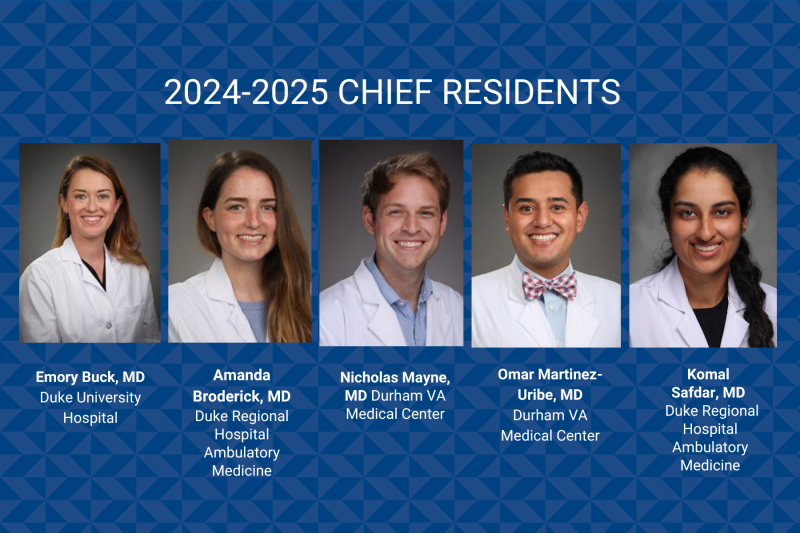
As the 2024-2025 academic year gets underway and a new cohort of chief residents comes onboard, Department of Medicine (DOM) clinicians and faculty members may notice an extra fresh face among the team members as the Duke Internal Medicine Residency programs expands its number of chief residents from four to five.
The expansion aligns with the size and growth of the residency program, said Internal Medicine Residency Program Director Dr. Aimee Zaas.
“Chief residents are first line in providing support, guidance, and near-peer mentorship to residents,” she said, “and given the size of our residency program, having an additional person engaged in the educational mission is really critical to our success."
“This change brings us more in line with the leadership structure of similarly sized residency programs,” said Dr. Lisa Criscione-Schreiber, vice chair for Education. “Additionally, the job of a chief resident is quite complex. They are responsible for a lot of teaching, supervision and mentoring of residents along with teaching and curriculum design, in addition to the administrative work to keep the schedule of a highly complex training program functioning. Excelling in all of these responsibilities really required more chief residents than we had.”
Drs. Komal Safdar and Amanda Broderick are co-managing the ambulatory and Duke Regional Hospital roles as Chief Resident for Ambulatory Medicine and Duke Regional Hospital. Chief residents include Drs. Emory Buck (Duke University Hospital), Omar Martinez-Uribe (Durham VA Medical Center), and Nicholas Mayne, MD (Durham VA Medical Center Quality Improvement and Patient Safety).
Emory Buck, MD 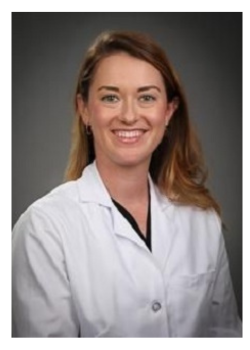
Duke University Hospital
Dr. Buck is a graduate of University of Virginia and Georgetown University School of Medicine. She was a pulmonary and critical care fellow prior to her chief resident year at Duke.
Q: How does being a chief resident fit with your career plans? What do you hope to gain from the experience?
Dr. Buck: Serving as a chief resident is a tremendous honor and privilege. This position offers an uncommon opportunity to impact each resident’s educational, personal, and professional growth journey. I am excited to teach across forums & disciplines, as well as grow as an educator. The chief resident role will open a new lens into graduate medical education curriculum development and program leadership, and will serve as a foundational experience as I build a career in academic medicine and clinical education.
Q: What will you bring to the role, and what do you plan or hope to accomplish during your term?
Dr. Buck: When I interviewed for Duke IM residency, Dr. Zaas said "We take our jobs seriously but not ourselves." I hope to bring humility & fun to the job to help foster our already strong sense of community amongst the #DukeFam, as well as further our mission to provide the best clinical education for our residents. Our goal as a group has been to be supportive of the residents' needs, both in and out of the hospital; remain transparent about ongoing issues for the residents; prepare for the upcoming transition to an increased ambulatory component; and more seamlessly integrate ABIM board studying into our current didactics.
Amanda Broderick, MD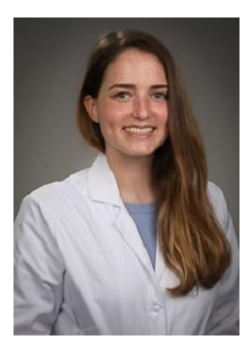
Duke Regional Hospital
Ambulatory Medicine
Dr. Amanda Broderick is a graduate of Carnegie Mellon University and Baylor College of Medicine. She was a hematology and oncology fellow prior to starting
her chief resident year.
Q: How does being a chief resident fit with your career plans? What do you hope to gain from the experience?
Dr. Broderick: Being a chief resident aligns perfectly with my career goals to be an academic oncologist and medical educator - as I hope to continue teaching trainees at all levels. During my own residency, my chief residents were exceptional resources for my personal and professional development. I hope to serve just as strongly as a near-peer mentor to our residents – while building my own medical education, leadership, communication, and team management skills
Q: What will you bring to the role, and what do you plan or hope to accomplish
during your term?
Dr. Broderick: As chief resident, I hope to cultivate a supportive environment that fosters a growth mindset among both our residents and faculty. One of my educational focuses will be on further developing the ambulatory curriculum, incorporating evidence-based practices to address clinical challenges in outpatient settings. By building strong relationships and open communication, I aspire to support our outstanding residents and medial students as they navigate through this formative stage of their careers.
Omar Martinez-Uribe, MD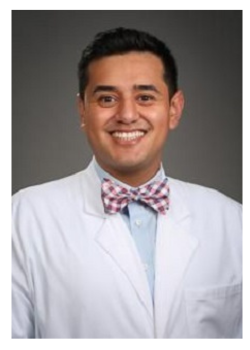
Durham VA Medical Center
Dr. Martinez-Uribe is a graduate of the University of Georgia and Duke University School of Medicine. He was a gastroenterology fellow prior to starting his chief resident year at the Durham VA Medical Center.
Q: How does being a chief resident fit with your career plans? What do you hope to gain from the experience?
Dr. Martinez-Uribe: As Duke chief residents, we pause our subspecialty training to serve the Duke IM Residency program. Personally, I am working towards finishing my Gastroenterology fellowship. Taking this year off from my subspecialty training will allow me to grow personally and professionally. Being a chief resident will allow me to refine my skills in clinical internal medicine, supervising trainees, leading conferences, and running clinical reports. I also hope to strengthen my confidence in administrative work. This will help me see if I would like to seek a career with an organizational leadership role in the future.
I am confident that the additional skills and experiences I gain will enhance my career prospects and enable me to contribute significantly to a Gastroenterology or Internal medicine academic program. I envision being involved in clinical practice, medical education, and possibly administrative efforts of a training program, and I am excited about the potential impact I can make. I am also excited to make and foster relationships with fellow residents, allied healthcare professionals, administrator specialists, attendings, and DUH / VA leadership to help me serve optimally.
Q: What will you bring to the role, and what do you plan or hope to accomplish during your term?
Dr. Martinez-Uribe: As VA chief resident I hope to bring trust, friendship, and mentorship to my role. I often think back about my own residency training and remember that my chiefs were the most dependable people I’ve worked with and around. They were quick to provide a helping hand or the right amount of correction to refine my medical practice. They also encouraged me to be the best version of myself as a doctor and as a person. I hope to emulate this for our residents.
I am also very passionate about our Duke IM Residency. It is a program that is near and dear to my heart professionally and personally. I hope to share my enthusiasm with the residents and hope we can continue to share this sentiment throughout the year.
My other goals for this year are to 1.) Continue to improve the quality of care for our veterans, 2.) Help ensure a safe and effective transition from a 28-hour call system at the VA to a day-night system, 3.) Revamp our educational sessions at Duke and at the VA with my co-chiefs, and 4.) Help maintain the #DukeFamily culture.
Komal Safdar, MD 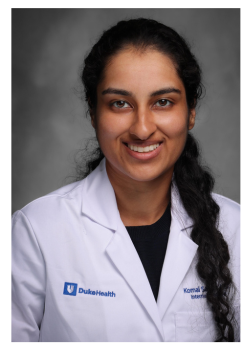
Duke Regional Hospital
Ambulatory Medicine
Dr. Safdar is a graduate of Syracuse University and Virginia Commonwealth University School of Medicine. She was a nephrology fellow prior to her chief resident year.
Q: How does being a chief resident fit with your career plans? What do you hope to gain from the experience?
Dr. Safdar: I am thrilled to be one of the chief residents for our internal medicine program. Outside of clinical practice, I have always enjoyed teaching, mentoring, developing curriculums, and improving existing systems. My goal is to stay in academics and one day be in a leadership position that allows me to improve educational experiences and mentor learners either in internal medicine or nephrology. I believe this chief year will provide invaluable personal and professional growth. I hope to gain experience in leading conferences, teaching, providing feedback, negotiating between different stakeholders, developing digital organizational skills, and learning about health system wide metrics. Finally, I am excited to develop long term relationships with our residents and leadership team – they are the reason I am
here!
Q: What will you bring to the role and what do you plan/hope to accomplish during your term?
Dr. Safdar: During my chief year, I will be overseeing our ambulatory curriculum (alongside my co-chief Amanda Broderick) and general medicine rotations at our Duke Regional Hospital. I hope to expand our robust ambulatory curriculum and incorporate evidence-based methods that promote long term retention of knowledge such as spaced repetition, retrieval, and case-based learning. At Duke Regional Hospital, I am excited to work with the hospitalists, internal medicine residents, and off service residents to hone in core internal medicine skills. Lastly, while scheduling and administrative tasks can at times be a daunting part of the role, I look forward to using these opportunities to help optimize scheduling and hopefully contribute to daily resident wellness. Overall, my goal is to share my passion for internal medicine, be there for our residents, grow as a clinician, and learn from our unparalleled internal medicine leaders. I couldn't be happier to give back to the program that made me the doctor I am today.
Nicholas Mayne, MD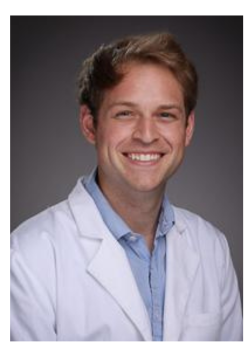
Durham VA Medical Center
Quality Improvement and Patient Safety
Dr. Mayne is a graduate of Duke University and Duke University School of Medicine. He will be the chief resident for quality improvement and patient safety at the Durham VA Medical Center.
Q: How does being a chief resident fit with your career plans? What do you hope to gain from the experience?
Dr. Mayne: I am pursuing a career in academic thoracic oncology and am currently applying for fellowship. As part of the CRQS program, I aim to leverage the didactic QI curriculum to develop expertise in QI methodology. This skillset will enable me to make meaningful contributions to quality improvement in oncologic care throughout my career. Additionally, I hope the leadership role of chief year and working with residents will effectively prepare me for my goal of remaining in academia.
Q: What will you bring to the role and what do you plan/hope to accomplish during your term?
Dr. Mayne: I hope to bring fun and excitement to my role as chief resident. I have been at Duke for college, medical school, and residency, and I am incredibly passionate about the institution and the residency program. I hope to use my enthusiasm to further deepen the already strong sense of togetherness that the program / “Duke Family” already fosters. Additionally, as part of my role as CRQS, I hope to complete a quality improvement project that will improve care for patients with cancer.